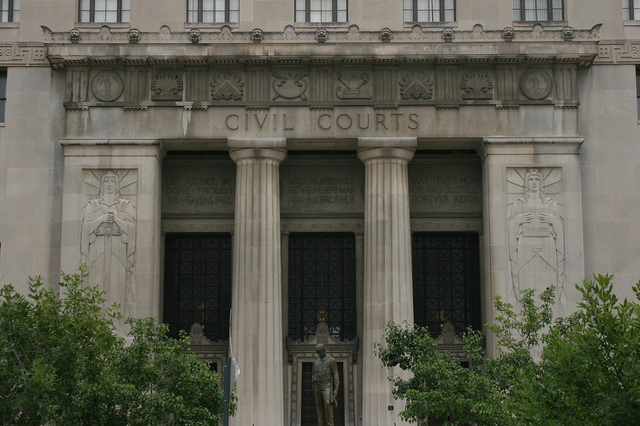
Many Americans are familiar with popular daytime courtroom TV shows like Judge Judy or People’s Court. While these shows present an exaggerated and dramatic scene of a small-claims court, the programs do highlight how many people face everyday problems that can be addressed through civil law. The outcomes of these cases in the real world can have serious implications — including eviction, loss of wages, or loss of child custody. In an interview with The New York Times, sociologist and MacArthur fellow Rebecca Sandfeur describes how access to civil justice is essential for low-income people, but a more equitable civil system will require more than increased availability of good lawyers.
Sandfeur argues that one of the main issues in civil justice is how few cases actually make it to civil court. Even when they do, only affluent plaintiffs’ cases are likely to be resolved. Cases for those who are poor or racial minorities tend not to receive the same fair shake. She argues that this lack of access to civil justice is at a crisis level that not only undermines the justice system, but exacerbates hardships for people that are already marginalized:
“If you start to think about how maybe 10 or 12 percent of justice problems become court cases, that means there’s another 90, 88 percent out there that isn’t making it to the formal justice system. That’s a lot of activity. And there’s no way all of it is turning out O.K. We have spectacular stories about civil injustices that people experience — informal evictions, harassment by landlords, wage theft…there’s an enormous amount of stuff out there that really isn’t going as it should. And that’s a big crisis because it undermines the rule of law, and it also creates hardship for millions of people.”
While legal representation is important, Sandfeur states that there are many solutions beyond legal representation, including nonprofits that help fund legal aid, technological resources, and others that may help people advocate for themselves in civil courts. She suggests that lay people can often defend themselves just as well as legal professionals — they may just need more resources to have a strong case. For instance, a New York-based website and app called Just Fix helps tenants create a habitability claim against landlords for disrepair or living conditions that are illegal. Sandfeur also discusses another innovative New York approach, this time in New York’s housing courts:
“Before universal access [the right to a lawyer in New York’s housing courts] came to be in eviction [proceedings], there were some really interesting experiments with people who are not lawyers who could appear with you in court and help you go through your eviction process. I did a study of them about three years ago, and it looks like there’s a body of cases for which that kind of program works really well. In the first year of that program, the most intensive kind of navigator, who is a social worker, who goes with you through the whole case, who works with you outside the case to attach you to benefits that you may not know you’re eligible for so that you can reliably pay your rent — they had a 100 percent success rate. Nobody they worked with got evicted. A number of states are exploring navigator-like programs.”

Comments 4
Joshua F. Randolph — April 20, 2023
Access to civil justice is a fundamental right that all individuals should have. It is essential for resolving legal disputes, ensuring fairness and equality, and upholding the rule of law. Without access to justice, people may be forced to compromise their rights, suffer from abuse or neglect, and lose confidence in the legal system. It also means that people are unable to secure necessary legal protections, such as child custody, domestic violence restraining orders, or eviction defense. Well, I would also like to read https://easyreadernews.com/what-are-the-basic-steps-of-writing-an-argumentative-essay/ article as writing an argumentative essay is sometime gets really tricky.
personal injury lawyer — November 7, 2023
This piece articulately highlights why access to civil justice is fundamental, especially for marginalized communities. The insights offered by sociologist Rebecca Sandfeur underline the importance of more than just legal representation in achieving justice. As a personal injury lawyer, understanding and advocating for these broader systemic changes is as crucial as defending individual cases to ensure fair treatment and compensation for all.
Karen A. Paine — December 10, 2023
Daytime courtroom TV shows like Judge Judy or People’s Court may provide a sensationalized portrayal of small-claims court, but they shed light on the everyday challenges individuals face that can be resolved through civil law. The real-world consequences of these cases, such as eviction, loss of wages, or custody battles, underscore the significance of civil justice. Sociologist and MacArthur fellow Rebecca Sandfeur, in an interview with The New York Times, emphasizes that ensuring access to civil justice is crucial for low-income individuals. However, achieving a more equitable civil system requires more than just increasing the availability of skilled lawyers.On a related note, for individuals dealing with legal issues, such as those arising from a Las Vegas car accident, finding qualified legal support is essential. Las Vegas Car Accident Lawyers can play a crucial role in navigating the complexities of personal injury cases, ensuring that individuals receive the assistance they need to secure their rights and recover from the aftermath of such incidents.
Neal — January 12, 2024
Justice truly matters, especially when it comes to your nursing career. If you ever find yourself entangled in legal issues with your nursing license, remember that seeking the counsel of a skilled nursing board lawyer can make all the difference. These legal professionals specialize in navigating the complexities of nursing regulations and can help ensure that justice is served in your case.